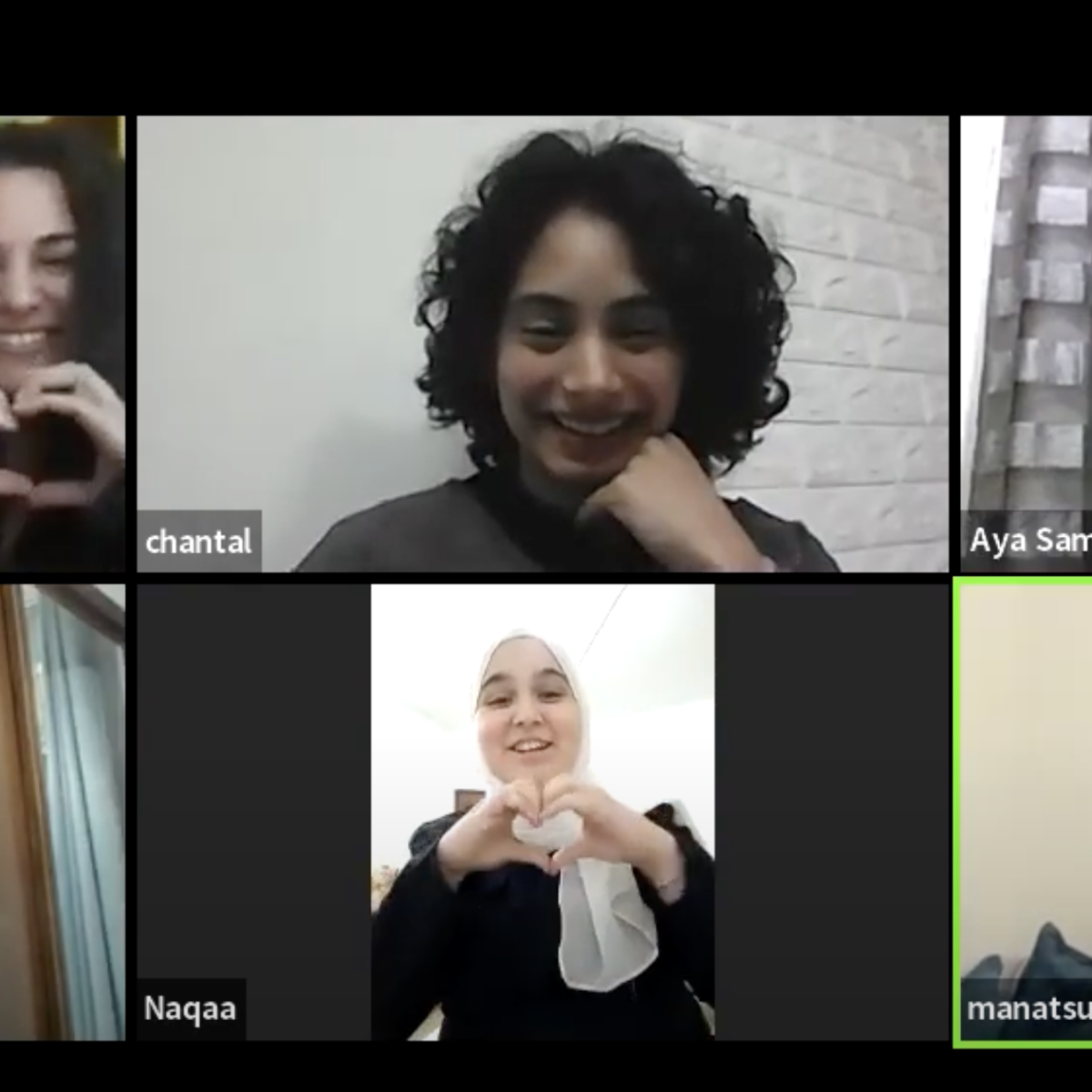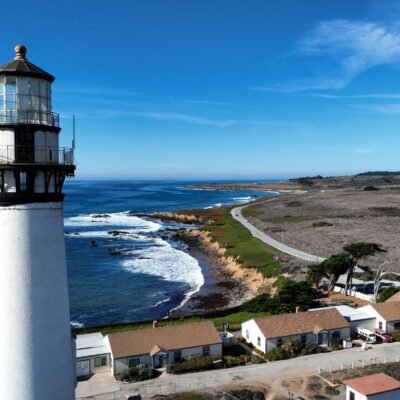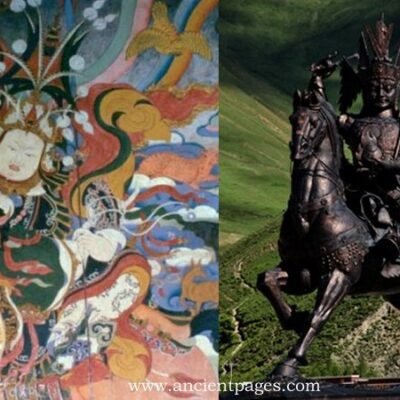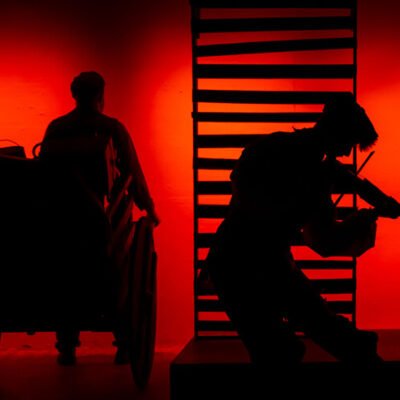The Freedom Theatre, a Palestinian community-based theatre and cultural center located in Jenin Refugee Camp, in the northern part of the West Bank, Palestine, has long been the center of cultural resistance. In September 2023, New York-based company Al Límite Collective participated in the Freedom Theatre’s Feminist Festival, devising a new play with young women from the theatre school, and experienced an invasion by Israeli armed forces while watching a performance by Salwa Nakkara. Upon their return to the United States on 7 October 2023, a wave of devastating violence began, and they have been an active part of the cultural resistance actions in solidarity with Palestinian artists.
Following a raid on the Freedom Theatre—in which artistic director Ahmed Tobasi, producing director Mustafa Sheta, and company member Jamal Abu Joas were attacked and detained—Al Límite Collective joined other New York City artists at the Cultural Resistance March on 13 January 2024. At this march, members of Al Límite Collective and Palestinians of Japan performed passages from Youth Against Invasion, featuring the words of Aya Samara and Chantal Rizkalla.
On 16 March 2024, artists from these groups came together to discuss the work of the Freedom Theatre and its school, the creation of Youth Against Invasion, and the performance of that text in the Cultural Resistance March. Participants from the Freedom Theatre included the head of the Freedom Theatre School, Yasmin Samir, and student artists Chantal Rizkalla, Aya Samara, and Naqaa Sammor. They were joined by Leah Barchar and Monica Hunken, co-founders of Al Límite Collective, as well as moderator Manatsu Tanaka, a dancer, actor, and artist who performed in the Cultural Resistance March. The following is the first installment of this conversation, which has been condensed from the initial HowlRound TV livestream.
In simple terms, the Freedom Theatre shows how art can change the world and how important it’s to keep fighting for what’s fair.
Manatsu Tanaka: As a theatre person, I’ve been really holding the Freedom Theatre very close to my heart. So today I’m very honored that I really get to see your faces and have a conversation with all of you. I’m very grateful, and I have so many questions.
This is open to anyone: what was your first experience with the Freedom Theatre?
Naqaa Sammor: My first performance in the Freedom Theatre was in Diligent Case 74. I consider theatre a part of me at the all times because actually I always searching for the truth, like theatre. I think theatre, it’s me. Chantal?
Chantal Rizkalla: I stumbled upon the Freedom Theatre while reading books actually. Two books: Mornings in Jenin and Jenin 2002. The more I read about it, the more I wanted to learn and to be a part of it. The first time I had the opportunity with the Freedom Theatre was in a workshop in the university that I participates in.
Aya Samara: I also had a workshop before joining the theatre. I always heard about the theatre, but never imagined that I will be part of it one day.
Manatsu: What does the Freedom Theatre mean to you?
Chantal: The Freedom Theatre means a lot to me because it’s a safe space where I can express myself through art, standing up for what I believe in. And it shows how strong and determined people are when they use theatre to speak out against unfairness and give a voice to those who are often ignored. The theatre gives hope and shows that even in tough times, we can fight for what’s right. In simple terms, the Freedom Theatre shows how art can change the world and how important it’s to keep fighting for what’s fair.
Manatsu: Thank you for that. The Freedom Theatre is in the Jenin refugee camp. What do you want people to know about Jenin?
Aya: I want them to be able to know that Jenin is full of life. It’s full of beautiful things. I love Jenin. There are lots of dreams, lots of stories.
Naqaa: People in Jenin, it’s very simple and beautiful. In Jenin, it is practical because they are a terrorist resistors. They wake up in the morning, dissipate the grief sense and difficult roads, and continue their life path. So people in Jenin are very strong.
It’s a vibrant community with a rich of heritage and resilient people and a strong sense of identity. Despite the changes they face, the people in Jenin are creative, resourceful, and determined to build a better future to themselves and their families.
Chantal: I want people to know that it’s more than just a place associated with conflict and hardship. It’s a vibrant community with a rich of heritage and resilient people and a strong sense of identity. Despite the changes they face, the people in Jenin are creative, resourceful, and determined to build a better future to themselves and their families. It’s important for others to understand the complexity of Jenin and to recognize the humanity and dignity of its residents beyond the headlines and stereotypes.
Yasmin Samir: There’s something that gets you addicted to this city. It’s unbelievable. I’ve been a lot of places in Palestine, internationally, all of that, but there is something about Jenin. It’s very rich, as Chantal said, a very rich country with a very distinguished identity to it. I think also that’s why we see a very, very strong line of resistance there. They do have a very special way of resisting.
But what I find astonishing about Jenin is that it is very alive and vibrant all the time. Despite everything that is happening.
Manatsu: Thank you. Monica, Leah, did you have something you want to add on?
Leah Bachar: Well, obviously Jenin is site of attacks by the Israeli army. So that means that there’s an attention there, an energy, a movement. It’s not just conflict. That’s maybe the media’s way of summing it up, but in reality, when you peel it apart, one of the best things about Jenin that I love is I laugh so much when I’m in Jenin. There is a humor there that is so resilient, so deep, so funny that that’s part of this familial feeling. There’s always somebody making sure you’re okay: “Are you okay? Do you need to eat? Do you want a ride?” Whatever it is. You forget about the military occupation. And then all of a sudden something appears, and you continue to work through that. And by the time you’re on the other side of that, you feel this power inside of you.
Monica Hunken: Even in our first rehearsal that we had with the girls there, there was shooting that happened while we’re… And we just kept dancing, kept moving, kept talking. There’s this big juxtaposition, right?





